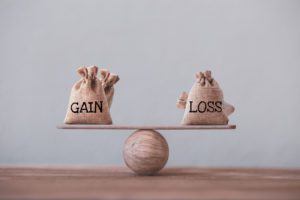In behavioral psychology there is a principle called risk aversion theory. The concept states the human mind has a naturally tendency to feel the pain of losses more than the pleasure of gains. For many investors who saw their accounts drop by more than 20% in 2022 they are probably all too familiar with the pain of these losses.
As the market has steadily climbed back up in 2023 many may be wondering why it feels like their balance never seems to come back up as quickly as it goes down. Some may have even dismissed these feelings as simply an emotional reaction to the impact the losses had on them. However, there is actually a mathematical reason why losses in the market seem to affect your overall balance more than gains of the same amount do.
Let’s take for example a person that invested $100,000. At the beginning of last year. In this hypothetical example, let’s say they lost 20% and began 2023 with a balance of $80,000. You might assume that if their account gains 20% this year they will return to their starting balance of $100,000. That however would not be the case. A 20% gain on $80,000 only gets their balance to $96,000. They would actually need a 25% gain on the remaining $80,000 just to get back to their original balance of $100,000.
Even, worse, lets Imagine the losses were significantly more and their losses were 50%, reducing their balance to $50,000. In that scenario, the person would need gains of double what they lost just to break even. At a 70% loss the gains needed just to get back to where they started would be 233% or roughly 3.3 times what they lost.
In other words, the greater the loss, the harder it is to recover from it. The reason for this is that the power of compound losses is just as real as the power of compound growth. We have all been told about the power of compound growth, and how even a small amount of money can become enormous if given a steady rate of return and enough time. What those examples rarely show however, is the impact significant losses can have on that final balance. One year of substantial losses in an account can set back projected growth for years to come.
That is why I believe adjusting your market strategy to reduce risk of loss during times of economic volatility makes so much sense. The trouble is doing that can be quite difficult. Markets are unpredictable, and more often than not, significant downturns happen quite quickly and with very little warning. By the time an investor can take action it might be too late.
This is why I suggest working with a money manager who actively manages your investments with proven strategies for preventing losses. Unfortunately, this is not as easy it might sound. Because of the time and resources required to actively manage a portfolio, most investment advisors don’t even try. They simply assign the portfolio to a group of investments that fit the risk tolerance of the individual and leave it alone. Their business model is based on increasing the number of clients they serve, rather than getting the best performance they can for their existing clients. That’s why most investment advisors in our industry are salespeople not money managers. (Here’s a little snippet on how we’re different: https://youtu.be/WzAZdLnkVHg)
I won’t lie, for more than a decade, this hands-off approach has worked quite well. Doing things of a protectionist nature, such as diversifying portfolios, utilizing contrarian strategies, or reducing market exposure often result in lower overall performance during a strong bull market. However, those are the very things that can save a portfolio from massive losses when the bears come back.
If you are concerned about the trajectory of our economy, now might be the perfect time to consider changing your overall strategy from one that is chasing market upside to a strategy of protecting what you have. In the long haul I believe it could result in better overall performance, and help you sleep a little better at night too.
(Past performance is no guarantee of future results. The advice is general in nature and not intended for specific situations)

